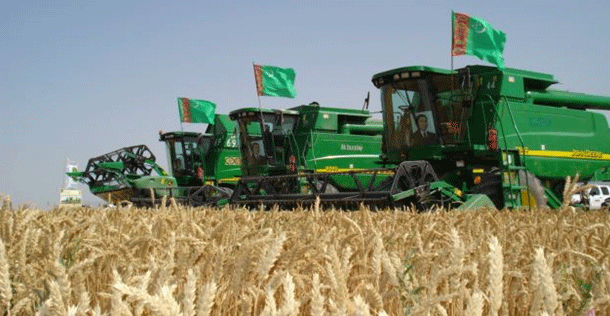In Turkmenistan’s Ahal Region, private truck drivers are being compelled by local authorities to participate in the wheat harvest. Reports from the residents of Garavekil and Yarykgekdje in Babadaihan District indicate that traffic police are stopping private trucks and seizing drivers’ licenses. These drivers are then issued a certificate mandating their “voluntary” involvement in the wheat transport campaign.
Enforced Participation and Compensation
The drivers are required to transport wheat from fields to collection points for two days. In lieu of financial compensation, they receive free fuel proportional to the distance traveled and are provided with meals twice a day along with the combine operators. After completing their duties, drivers return to the police station with a certificate from the grain collection points to reclaim their licenses. Additionally, they receive verbal gratitude from the district head for their “voluntary” contribution to the wheat harvest.
Labor Rights and Agricultural Practices
This practice has sparked debate about labor rights and the ethics of compelling private individuals to participate in state agricultural operations. The drivers’ forced participation without monetary compensation raises significant concerns about the exploitation of labor and the efficiency of such logistical practices in modern agriculture.
Context and Comparisons
In the global context, the efficiency of agricultural logistics is critical for ensuring timely harvests and reducing post-harvest losses. Modern agricultural practices typically rely on voluntary labor, paid adequately, and mechanized transport solutions to optimize efficiency. The situation in Turkmenistan contrasts sharply with these norms, highlighting the unique challenges faced by the country in its agricultural sector.
According to the latest data, efficient agricultural logistics can significantly impact overall productivity. For example, countries with well-organized transport and logistics systems report higher yields and reduced wastage. The Food and Agriculture Organization (FAO) emphasizes the importance of integrated supply chains and fair labor practices in achieving sustainable agricultural development.
The forced involvement of private truck drivers in Turkmenistan’s wheat harvest underscores the urgent need for reform in agricultural logistics and labor practices. Ensuring fair compensation and voluntary participation is essential for sustainable agricultural development and the protection of workers’ rights. As the global agricultural community continues to advance, it is crucial for Turkmenistan to adopt more equitable and efficient practices to enhance productivity and labor relations.
Error





